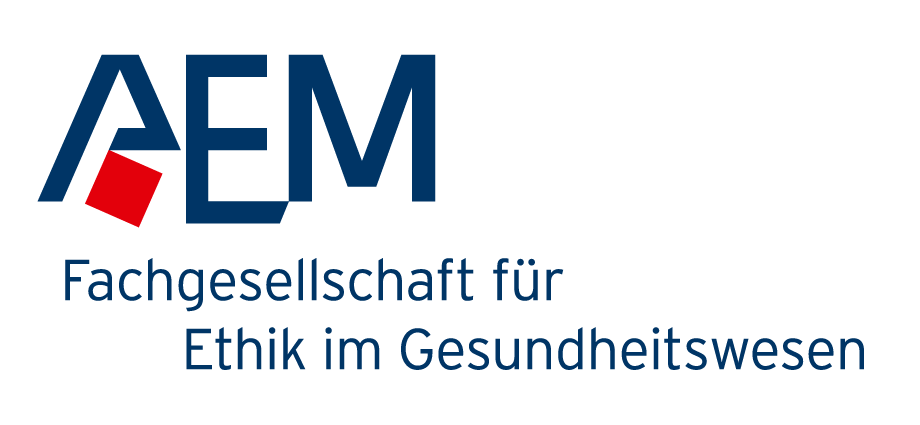Neuroethik
Koordination: Kirsten Brukamp, Ludwigsburg; Orsolya Friedrich, Hagen; Philipp Kellmeyer, Mannheim.
Bericht zur Mitgliederversammlung 2024.
Arbeitsgemeinschaft Neuroethik
Neuroethics Network Germany
Inhaltsübersicht / Contents
1. Arbeitsgemeinschaft Neuroethik (AG NE) (auf Deutsch)
2. German Neuroethics Network (NENG) (in English)
3. Resources for Neuroethics (in English)
1. Arbeitsgemeinschaft Neuroethik (AG NE)
Die Arbeitsgemeinschaft Neuroethik (AG NE) in der Akademie für Ethik in der Medizin (AEM) stellt ein Netzwerk dar, um ethische Themen der Neuromedizin sowie der Neuro- und Kognitionswissenschaften zu diskutieren.
Zielsetzungen
• Vernetzung in der deutschsprachigen Wissenschaft zu den Themen Neuroethik und Neurophilosophie
• Vorstellungen von Forschungsthemen und -interessen der Mitglieder
• Diskussionen und Zusammenarbeit zu aktuellen Inhalten der Neuroethik
• Austausch zu Konferenzen, Forschungsförderungsprogrammen und Konsultationen
Arbeitsschwerpunkte
• Grundlagen und Kontexte der Neuroethik und der Neurophilosophie
• Neurotechnologien
• Klinische Neuroethik
Publikation, die aus der Arbeitsgemeinschaft Neuroethik hervorgegangen ist
Sabine Müller, Merlin Bittlinger, Kirsten Brukamp, Markus Christen, Orsolya Friedrich, Malte-C. Gruber, Jon Leefmann, Grischa Merkel, Saskia K. Nagel, Marco Stier, Ralf J. Jox (2018): Neuroethik – Geschichte, Definition und Gegenstandsbereich eines neuen Wissenschaftsgebiets. Ethik in der Medizin (Ethik Med) 30: 91 – 106. https://doi.org/10.1007/s00481-018-0477-9.
Projekte mit Beteiligung der Mitglieder (Auswahl)
• Research Hub Neuroethics, Forschungszentrum Jülich, Universität Tübingen, FernUniversität in Hagen, Universität Mannheim:
https://www.research-hub-neuroethics.net/de
• NEXUS Experiments, Zentrum BrainLinks-BrainTools, Universität Freiburg: https://nexusexperiments.org
Mitglieder (Auswahl)
Kirsten Brukamp, Evangelische Hochschule Ludwigsburg, Schwerpunkte: Ethik der Neurowissenschaften, der Neurotechnologien
und der klinischen Neuromedizin, weitere Informationen
Jan Christoph Bublitz, Universität Hamburg, Schwerpunkt: Neurorecht, weitere Informationen
Markus Christen, Universität Zürich, weitere Informationen
Jens Clausen, Pädagogische Hochschule Freiburg, weitere Informationen
Orsolya Friedrich, FernUniversität in Hagen, weitere Informationen
Malte-C. Gruber, Justus-Liebig-Universität Gießen, weitere Informationen
Jan-Hendrik Heinrichs, Forschungszentrum Jülich, weitere Informationen
Ralf J. Jox, Universität Lausanne, Schwerpunkte: Geschichte und Theorie der Neuroethik, klinische Neuroethik,
chronische Bewusstseinsstörungen, Brain-Computer-Interfaces, Künstliche Intelligenz und Neuroethik, weitere Informationen
Philipp Kellmeyer, Universität Mannheim, Schwerpunkte: Neuroethik, Neurotechnologien und Grundrechte,
partizipatorische Ethik, klinische Ethik, weitere Informationen
Felicitas Krämer, Universität Potsdam, weitere Informationen
Grischa Merkel, Universität Greifswald, weitere Informationen
Sabine Müller, Charité – Universitätsmedizin Berlin, weitere Informationen
Annette Rogge, Universitätsklinikum Schleswig-Holstein, Schwerpunkt: Ethik in der klinischen Neuromedizin, weitere Informationen
Marco Stier, Universität Münster, weitere Informationen
Kontaktdaten des Koordinationsteams
Kirsten Brukamp, Evangelische Hochschule Ludwigsburg, weitere Informationen
Orsolya Friedrich, FernUniversität in Hagen, weitere Informationen
Philipp Kellmeyer, Universität Mannheim, weitere Informationen
2. Neuroethics Network Germany (NENG)
The Neuroethics Network Germany (NENG) in the Academy for Ethics in Medicine (AEM) in Germany is a network for discussing ethical topics in neuromedicine, neuroscience, and cognitive science.
Aims
• Networking for German-language academic institutions for the topics neuroethics and neurophilosophy
• Presentations of members‘ research topics and interests
• Discussions and collaborations for current issues in neuroethics
• Information about conferences, research funding programs, and consultations
Main topics
• Foundations and contexts of neuroethics and neurophilosophy
• Neurotechnologies
• Clinical neuroethics
Projects with network members (selection)
International Project „Hybrid Minds“, Ottawa (Canada), Hamburg (Germany), Lausanne (Switzerland), Berlin (Germany): https://hybridminds.webflow.io
Members (selection)
Kirsten Brukamp, Protestant University Ludwigsburg, areas of interest: ethics of neurosciences, of neurotechnologies,
and of clinical neuromedicine, additional information
Jan Christoph Bublitz, Hamburg University, area of interest: neurorights, additional information
Markus Christen, University of Zurich, additional information
Jens Clausen, Freiburg University of Education, additional information
Orsolya Friedrich, Hagen Distance-Learning University, additional information
Malte-C. Gruber, Gießen University, additional information
Jan-Hendrik Heinrichs, Research Center Jülich, additional information
Ralf J. Jox, Lausanne University, areas of interest: history and theory of neuroethics, clinical neuroethics,
chronic disorders of consciousness, brain-computer interfaces, artificial intelligence and neuroethics, additional information
Philipp Kellmeyer, Mannheim University, areas of interest: neuroethics, neurotechnologies and fundamental rights,
participatory ethics, clinical ethics, additional information
Felicitas Krämer, Potsdam University, additional information
Grischa Merkel, Greifswald University, additional information
Sabine Müller, Charité – University Medicine Berlin, additional information
Annette Rogge, University Hospital Schleswig-Holstein, area of interest: ethics in clinical neuromedicine, additional information
Marco Stier, Münster University, additional information
Contact information for the coordinators
Kirsten Brukamp, Protestant University Ludwigsburg, additional information
Orsolya Friedrich, Hagen Distance-Learning University, additional information
Philipp Kellmeyer, Mannheim University, additional information
3. Resources for Neuroethics
3.1 Professional Societies and Institutions
International Neuroethics Society
https://www.neuroethicssociety.org
Italian Society for Neuroethics
http://societadineuroetica.it
Neuroethics Canada
https://neuroethics.med.ubc.ca
3.2 Journals
Neuroethics Journal
https://link.springer.com/journal/12152
American Journal of Bioethics AJOB Neuroscience
https://www.tandfonline.com/journals/uabn20
3.3 Funding Programs in Germany and Europe
ERA-NET NEURON: Ethical, Legal, and Social Aspects (ELSA) of Neuroscience
https://www.neuron-eranet.eu/joint-calls/elsa
ELSA: Neurowissenschaften national / Neurosciences National
https://www.gesundheitsforschung-bmbf.de/de/neurowissenschaften-national-15781.php
ELSA: Neurowissenschaften international / Neurosciences International
https://www.gesundheitsforschung-bmbf.de/de/neurowissenschaften-international-5038.php
ELSA: Neuroethics Research Hub
https://www.gesundheitsforschung-bmbf.de/de/neurowissenschaften-querschnittsmassnahme-research-hub-17540.php
ELSA: Neuroethics
https://www.gesundheitsforschung-bmbf.de/de/neuroethic-2646.php
3.4 Featured Topic: Neurotechnologies and Neurorights
Neuroethical reflection covers a wide range of topics. The examples neurotechnologies and neurorights have been selected to illustrate the current debate with recent publications, declarations, and recommendations.
Human Rights Council Advisory Committee (2024): Impact, opportunities and challenges of neurotechnology with regard to the promotion and protection of all human rights. Report of the Human Rights Council Advisory Committee. A/HRC/57/61. https://documents.un.org/doc/undoc/gen/g24/133/28/pdf/g2413328.pdf [Oct. 24, 2024].
Marcello Ienca (2021): On neurorights. Frontiers in Human Neuroscience 15: 701258. https://www.frontiersin.org/journals/human-neuroscience/articles/10.3389/fnhum.2021.701258/full [Oct. 24, 2024].
International Bioethics Committee IBC of the United Nations Educational, Scientific and Cultural Organization UNESCO (2021): Ethical issues of neurotechnology. Paris: UNESCO. https://unesdoc.unesco.org/ark:/48223/pf0000378724 [Oct. 24, 2024].
Sjors Ligthart, Marcello Ienca, Gerben Meynen, Fruzsina Molnar-Gabor, Roberto Andorno, Christoph Bublitz, Paul Catley, Lisa Claydon, Thomas Douglas, Nita Farahany, Joseph J. Fins, Sara Goering, Pim Haselager, Fabrice Jotterand, Andrea Lavazza, Allan McCay, Abel Wajnerman Paz, Stephen Rainey, Jesper Ryberg, Philipp Kellmeyer (2023): Minding Rights: Mapping Ethical and Legal Foundations of ‚Neurorights‘. Cambridge Quarterly of Healthcare Ethics (Camb Q Healthc Ethics) 32 (4): 461 – 481. https://doi.org/10.1017/S0963180123000245 [Oct. 24, 2024].
Organisation for Economic Co-operation and Development OECD (2019): Recommendation of the Council on Responsible Innovation in Neurotechnology. OECD/LEGAL/0457. Paris: OECD. https://legalinstruments.oecd.org/en/instruments/OECD-LEGAL-0457 [Oct. 24, 2024].
Organisation for Economic Co-operation and Development OECD (2024): Neurotechnology Toolkit. To support policymakers in implementing the OECD Recommendation on Responsible Innovation in Neurotechnology. Paris: OECD. https://www.oecd.org/content/dam/oecd/en/topics/policy-sub-issues/emerging-technologies/neurotech-toolkit.pdf [Oct. 24, 2024].
